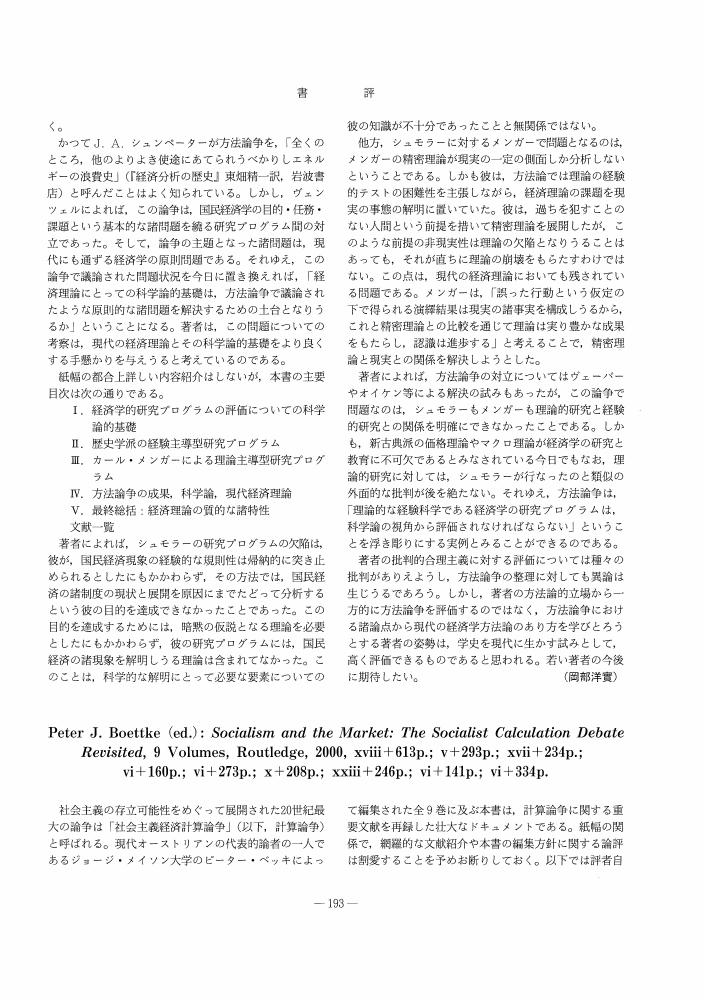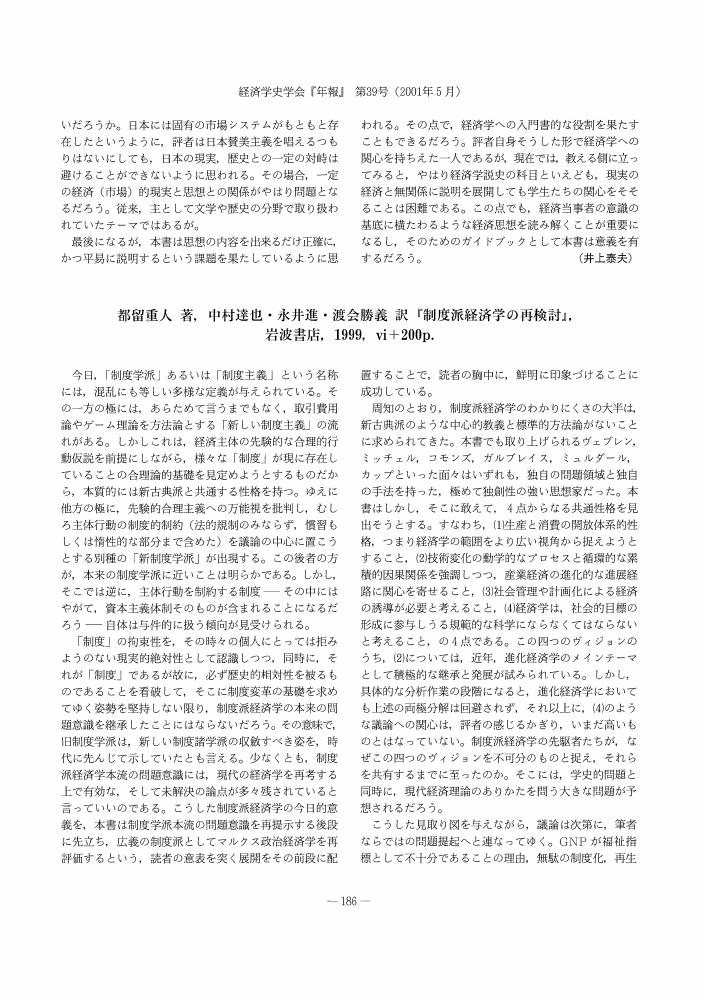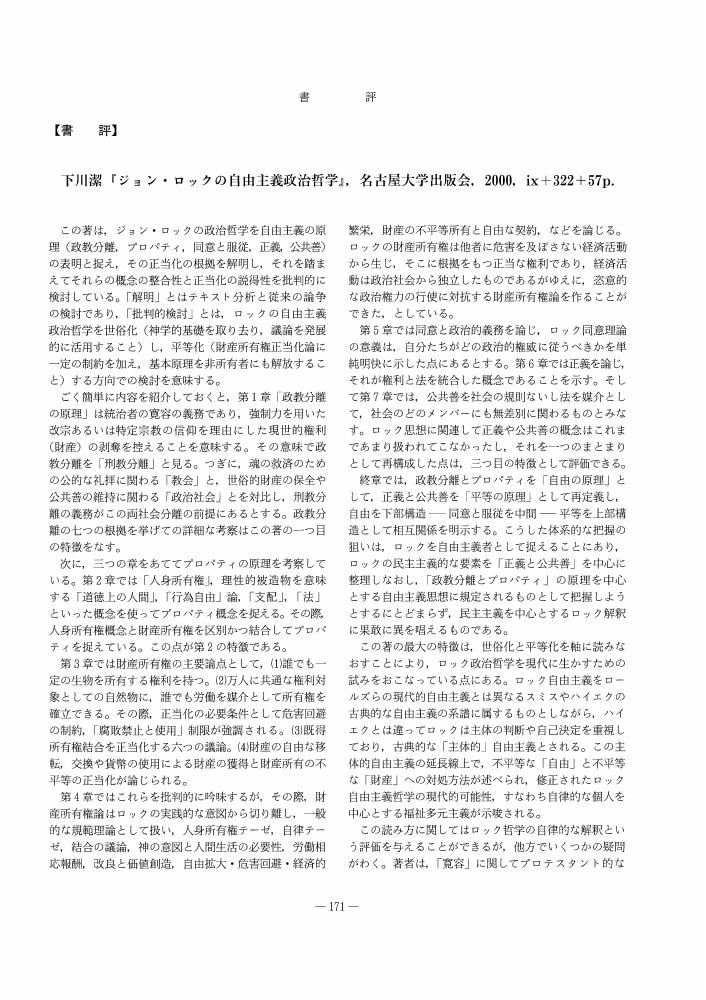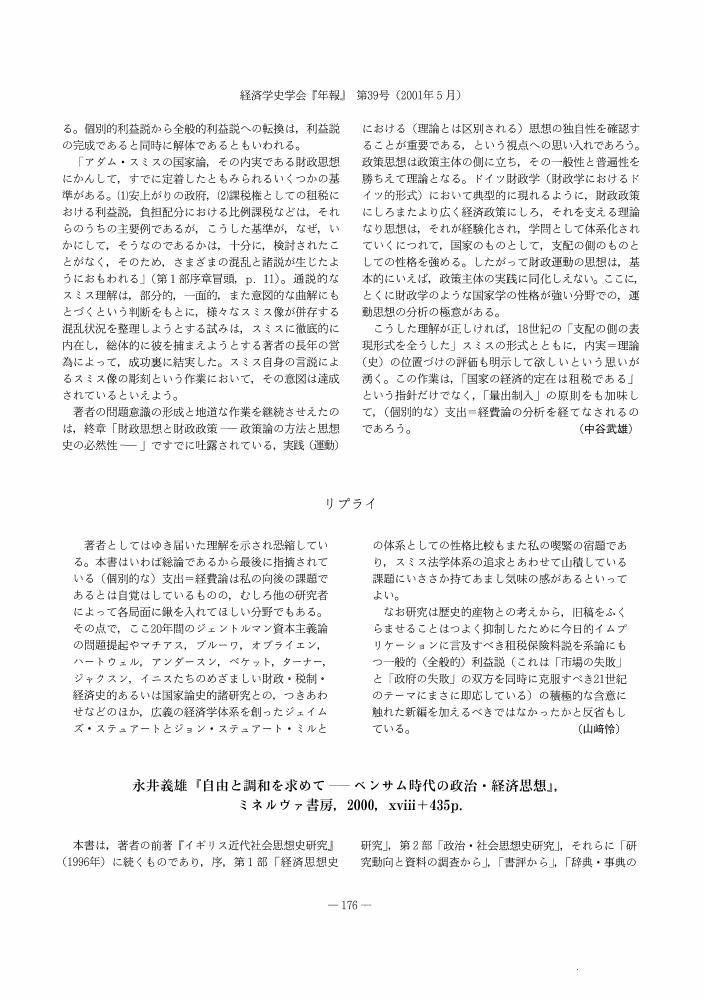- 著者
- 塚本 恭章
- 出版者
- The Japanese Society for the History of Economic Thought
- 雑誌
- 経済学史学会年報 (ISSN:04534786)
- 巻号頁・発行日
- vol.39, no.39, pp.193-195, 2001 (Released:2010-08-05)
- 著者
- 井上 義朗 都留 重人
- 出版者
- 経済学史学会
- 雑誌
- 経済学史学会年報 (ISSN:04534786)
- 巻号頁・発行日
- vol.39, no.39, pp.186-188, 2001 (Released:2010-08-05)
- 著者
- 岡村 東洋光 下川 潔
- 出版者
- 経済学史学会
- 雑誌
- 経済学史学会年報 (ISSN:04534786)
- 巻号頁・発行日
- vol.39, no.39, pp.171-173, 2001 (Released:2010-08-05)
- 著者
- 只腰 親和 伊藤 哲
- 出版者
- 経済学史学会
- 雑誌
- 経済学史学会年報 (ISSN:04534786)
- 巻号頁・発行日
- vol.39, no.39, pp.173-174, 2001 (Released:2010-08-05)
1 0 0 0 OA カール・ポランニーの「二重運動」と自由
- 著者
- 若森 みどり
- 出版者
- The Japanese Society for the History of Economic Thought
- 雑誌
- 経済学史学会年報 (ISSN:04534786)
- 巻号頁・発行日
- vol.39, no.39, pp.146-158, 2001 (Released:2010-08-05)
- 参考文献数
- 26
As did his many contemporary thinkers Karl Polanyi (1886-1964), in the last chapter of his The Great Transformation under the title of “Freedom in a Complex Society, ” dealt with the problem of freedom. In the keen distinction from the ordinal interpretation that the tendency “from laissez-faire to state intervention” or “from individualism to collectivism” directly led to Fascism, Polanyi described the institutional or historical origins of that crisis in the light of his “double movement” interpretation of the nineteenth century industrial society.According to him, the problem of freedom in his time arose on two levels: the institutional and the moral or religious. How is the “free society” reorganized? On the institutional level, Polanyi suggested that the improvement of industrial conditions and employment through the support of planning and control were important. On the moral and religious level, a new view of freedom was needed. It was in this regard that Polanyi respected Robert Owen, because Owen not only rejected the identification of freedom with the mere liberation of profit motives or with “individualization”, but favored the reconstruction of humanity and freedom in the form of “society as a whole”.
- 著者
- 音無 通宏
- 出版者
- 経済学史学会
- 雑誌
- 経済学史学会年報 (ISSN:04534786)
- 巻号頁・発行日
- vol.39, no.39, pp.176-178, 2001 (Released:2010-08-05)
- 著者
- 渡会 勝義 中矢 俊博
- 出版者
- 経済学史学会
- 雑誌
- 経済学史学会年報 (ISSN:04534786)
- 巻号頁・発行日
- vol.39, no.39, pp.179-181, 2001 (Released:2010-08-05)
1 0 0 0 OA P. スラッファ編『リカードウ全集』, 全11巻, 雄松堂, 1969-1999
- 著者
- 中村 廣治
- 出版者
- 経済学史学会
- 雑誌
- 経済学史学会年報 (ISSN:04534786)
- 巻号頁・発行日
- vol.39, no.39, pp.178-179, 2001 (Released:2010-08-05)
- 著者
- 中谷 武雄 山崎 怜
- 出版者
- 経済学史学会
- 雑誌
- 経済学史学会年報 (ISSN:04534786)
- 巻号頁・発行日
- vol.39, no.39, pp.175-176, 2001 (Released:2010-08-05)
1 0 0 0 OA ケインズ研究の動向
- 著者
- 平井 俊顕
- 出版者
- The Japanese Society for the History of Economic Thought
- 雑誌
- 経済学史学会年報 (ISSN:04534786)
- 巻号頁・発行日
- vol.39, no.39, pp.74-80, 2001 (Released:2010-08-05)
- 参考文献数
- 53
The purpose of this paper is to survey recent studies of Keynes's theory which deal with A Treatise on Money and The General Theory. In Section 1, studies of A Treatise on Money are discussed in view of (i) the determination of price and output, (ii) monetary theory, and (iii) its relation to Wicksellian theories. In Section 2, studies of Keynes's theoretical development between the two books are examined. In Section 3, studies of The General Theory, mainly by post-Keynesians and neo-Ricardians, and partially by Income-Expenditure Keynesians are discussed. And in Section 4, studies of the relation between the two books are examined in terms of discontinuity and continuity.
1 0 0 0 OA 1840年代のアメリカにおけるフーリエ主義の受容
- 著者
- 石塚 幸太郎
- 出版者
- The Japanese Society for the History of Economic Thought
- 雑誌
- 経済学史学会年報 (ISSN:04534786)
- 巻号頁・発行日
- vol.39, no.39, pp.103-115, 2001 (Released:2010-08-05)
- 参考文献数
- 3
The ideas of Charles Fourier were imported into 1840's America by Albert Brisbane. Fourier's ideas, some of which seemed eccentric and extravagant to Brisbane, were abridged and adapted to the context of American society. Brisbane claimed that the building of a new community “Association” would be the best solution to all social problems of that time. In his plan, about 1800 people would live together cooperatively in a labor system called “attractive industry” which promised high productivity. An “Association” would be a community in which each member would hold stock certificates as personal property.In the Jacksonian era, chartered business corporations were attacked for their privileges. However, in the course of deliberating the general incorporation act some economists including Henry Carey, argued in their favor. They thought that business corporations supported by small shareholders would provide an oppotunity for poor people to become independent and reasonably wealthy.Brisbane argued that his Association was based on the operating style of current business corporations. In addition, he pointed out that this shared property system would harmonize diverse interests of members, interests which had up until then been the source of ruinous conflicts.Brisbane presented his Associaton, which was based on a joint stock property system originally found in the business world, as the best means of social reform.
1 0 0 0 OA 「近代経済学史」研究の成果と課題
- 著者
- 井上 琢智
- 出版者
- The Japanese Society for the History of Economic Thought
- 雑誌
- 経済学史学会年報 (ISSN:04534786)
- 巻号頁・発行日
- vol.39, no.39, pp.81-85, 2001 (Released:2010-08-05)
The reseach into the history of Modern Economics which is understood to be economics on the principle of diminishing marginal utility and non-Marxian economics in Japan, began in the the 1960s, but these studies were few in comparison to the those concerning Classical Ecomomics. From 1970 onwards, conferences and the societies commemorated W. S. Jevons, C. Menger, L. Walras, A. Marshall, and J. A. Shumpeter, and their collected works were edited and published. Then in the 1980s and after, young Japanese scholars were encouraged to study and publish articles and books in English, German, and French, some of which are highly esteemed at home and abroad. By the 1990s the level of the study of Modern Economics in Japan was the same as that of research regarding Classical Economics.From the 1960s to the 1990s, the themes changed. In the 1960s some scholars became interested in the theories of Marshall and Keynes, and a few of them wrote articles on the theories and methodologies of Menger, Walras, V. Pareto, J. A. Schumpeter, etc. But after the 1970s, articles were written primarily on the theories and thought of Walras and Menger as well as Marshall, Keynes, Jevons. And further, we greatly widened our horizons and made an effort to treat the entire body of thought of each economist. Now we must study their epistemologies and scientific methods underlying their economics and thought. If we don't, we cannot understand the true meaning of the “general” in Keynes' The General Theory of Employment, Interest and Money.
1 0 0 0 OA 初期ピグーの再評価
- 著者
- 本郷 亮
- 出版者
- The Japanese Society for the History of Economic Thought
- 雑誌
- 経済学史学会年報 (ISSN:04534786)
- 巻号頁・発行日
- vol.39, no.39, pp.116-127, 2001 (Released:2010-08-05)
- 参考文献数
- 18
This paper deals with A. C. Pigou's economic thought before the World War I, especially in relation to Liberal Reform (1906-11). Pigou was very interested in the Royal Commission on the Poor Law and Relief of Distress. He submitted “Memorandum on some Economic Aspects and Effects of Poor Law Relief” to the Royal Commission in 1907. In this “Memorandum”, we can distinguish his two welfare criteria: the size and distribution of the national dividend. His motives to write Wealth and Welfare (1912) could be mainly found in those years.The National Insurance Act (1911) was one of the most epoch-making laws during this period. Pigou examined this institution in his book Wealth and Welfare because labour problems, including destitution and unemployment, were an urgent economic theme for him and his contemporaries. In Unemployment (1913) he considered that not only public works as means for relieving unemployment among the poor, but also insurance and National-Minimum were necessary. Liberal Reform was an essential background of Pigou's welfare economics.
1 0 0 0 OA ハロッドの「経験の原理」と帰納法
- 著者
- 齋藤 隆子
- 出版者
- The Japanese Society for the History of Economic Thought
- 雑誌
- 経済学史学会年報 (ISSN:04534786)
- 巻号頁・発行日
- vol.39, no.39, pp.128-145, 2001 (Released:2010-08-05)
- 参考文献数
- 27
This paper studies Roy Harrod's philosophical work, Foundations of Inductive Logic (1956). As compared to his economic theory, his philosophical work (and its relation to his economic theory) has not drawn much attention so far. This paper attempts to fill this gap, and demonstrates the significance of the fact that Harrod was a philosopher as well as an economist. In particular, this paper reviews Harrod's argument by illustrating the main differences in Harrod's empiricist notions of probability and induction, and Keynes' rationalist notion of them (A Treatise on Probability, 1921). Then it demonstrates how these differences in their understanding of probability and induction are reflected in their different approaches to economics.
- 著者
- 八木 紀一郎
- 出版者
- The Japanese Society for the History of Economic Thought
- 雑誌
- 経済学史学会年報 (ISSN:04534786)
- 巻号頁・発行日
- vol.39, no.39, pp.86-93, 2001 (Released:2010-08-05)
- 参考文献数
- 36
Historical research into Austrian economics was encouraged by two conferences in 1971 (Bellagio and Vienna) and one in 1989 (Durham, NC). Grounded on a thorough archival investigation, study of Carl Menger and Böhm-Bawerk has made a remarkable progress. Although study of Wieser is rare, we now have a good understanding of founding fathers of the Austrian school in the intellectual traditions of the Germanspeaking world. However, the theoretical research in this area shows a lag. A new general view of Austrians is still to come. One of the problems involved in this field of study is whether, Austrian' school is a branch of neo-classicism or not. In the last part of the survey, the author poses the question about the vision that guides historical reseach regarding the Austrians. His tentative answer is that a historical researcher need not adopt the same view as those of the economists he studies. The author suggests that an ‘evolutionary’ view might offer a better framework for the research than the ‘Austrian’ view could offer.
1 0 0 0 OA History of Japanese Economic Thought
- 著者
- 池尾 愛子
- 出版者
- The Japanese Society for the History of Economic Thought
- 雑誌
- 経済学史学会年報 (ISSN:04534786)
- 巻号頁・発行日
- vol.39, no.39, pp.94-102, 2001 (Released:2010-08-05)
- 参考文献数
- 29
There are several groups of scholars, both non-Japanese and Japanese, pursuing historical studies of Japanese economic thought. There have been significant societal activities such as nationwide meetings organized by the Society for the History of Japanese Economic Thought and publications both in English and in Japanese on the history of Japanese economic thought by the Japanese Society for the History of Economic Thought. Frequently discussed topics are the economic ideas in the closeddoor period, Japanese enlightenment and modernization, the introduction of Western economics into Japan, Japanese contributions to economics, and the internationalization of economics. Japan has a rich history of economic thought cultivated in Japan from the Tokugawa period to the present. Unfortunately the research results are scattered in various academic journals, commercial magazines, and university organs. Therefore, books and monographs are a powerful medium in this field. The creation of a single forum, ideally electronic, for scholarly communication is most urgently needed in order to inform the general population, including economists, of the serious research results regarding this subject. One of the important goals that Japanese scholars should attempt is to produce research results in English even if they lose something in translation.
1 0 0 0 OA マーシャルとケンブリッジ学派
- 著者
- 橋本 昭一
- 出版者
- The Japanese Society for the History of Economic Thought
- 雑誌
- 経済学史学会年報 (ISSN:04534786)
- 巻号頁・発行日
- vol.39, no.39, pp.66-73, 2001 (Released:2010-08-05)
- 参考文献数
- 42
Marshall's theoretical and educational efforts and success in the field of economics was already highly appreciated even in his day. Nevertheless, it is a curious fact that almost all of his students and disciples at Cambridge or at other institutions have gradually hesitated to follow the lines he indicated. This is one of the reasons why he was called a ‘soaring eagle’ or ‘enigma’. In order to not only reassess Marshall's economic thought, but also to elucidate his attitude foward contemporary economists and their methodology, much important material has been published in the last decade, namely by Whitaker (1990), Raffaelli (1990), Groenewegen (1995), Raffaelli (1995), Whitaker (1996), Groenewegen (1997), Groenewegen (1998). These works consist of a new bulky biography, collected works of 8 volumes, more than a thousand items of correspondence, a collection of ‘unknown voices’ in response to Marshall's economics, critical essays, and Marshall's unpublished lectures. Also very beneficial for Marshall scholarship are materials such as The collected Works of Sidgwick (1996) and Fawcett (1995). In the beginning of the new century, we can start to analyze such questions as ‘Is Marshall a communitarian or a libertarian in his circle?’ In this case, we should like to include Sidgwick and Fawcett in the Cambridge Circle.
1 0 0 0 OA 制度学派
- 著者
- 高 哲男
- 出版者
- The Japanese Society for the History of Economic Thought
- 雑誌
- 経済学史学会年報 (ISSN:04534786)
- 巻号頁・発行日
- vol.39, no.39, pp.58-65, 2001 (Released:2010-08-05)
- 参考文献数
- 23
We have seen salutary advances in the historico-theoretical study of Institutional Economics in the last decade. The focal point seems to have shifted from Veblen to Commons, reflecting the florescence of so-called New Institutional Economics that puts stress on the spontaneous growth of social order guided by the free will of individual. It is, indeed, a fact that Commons's institutionalism that emphasizes the role of volitional will and artificial selection has close links with New Institutional Economics (Rutherford, 1994). Ramstad (1990; 1995) construes the concept of “working rules” as the connecting and binding element in the multiplicative theory of Commons. Biddle (1990) alleges that Commons developed an evolutionary theory of the results of intended conduct, though he did not overlook the unintended results of conduct. These two interpretations are persuasive, but certain inevitable questions might come to mind: Are the concepts of working rules too vague and elastic to use for objective analysis?: Is it possible to maintain logical consistency between the logic of the outcome of the intended conduct and the logic of unintended outcome?A new interpretation of Veblen's theory of evolution is presented by Taka (1991; 1996). Although the instinct of workmanship (idle curiosity) leads autonomously to the development of technology, the prevailing institutions of the society, that is, the norms of conduct or the standards of esteem, are always the consequences of emulation. The order of development or expansion is as follows: instinct of workmanship→exploit (pro wess)→trophy→private property→conspicuous consumption and leisure. Since these norms of conduct have been historically accumulated in strata like the twisted ladder of a gene, people forced to adapt to the new circumstances often choose to retard or retrogress to the inherited and accustomed ways of thinking, that is, old fashioned customs and institutions. Veblen's theory of evolution consists of evolution and retrogression.Generally speaking, in order to reinterpret critical or heterodox economic thoughts such as Institutionalism, we must also reinterpret American orthodox, neo-classical thought at the same time. Mehring (1997), Shute (1997) and Yonay (1998) make, in this sense, a valuable contribution to the study of Institutional Economics.
1 0 0 0 OA J. S. ミル研究の今後
- 著者
- 馬渡 尚憲
- 出版者
- The Japanese Society for the History of Economic Thought
- 雑誌
- 経済学史学会年報 (ISSN:04534786)
- 巻号頁・発行日
- vol.39, no.39, pp.42-49, 2001 (Released:2010-08-05)
- 参考文献数
- 35
This essay addresses what will be studied in regard to J. S. Mill within coming ten years, and the research methods employed. For the present, Mill students are strongly recommended to compare works on Mill by two historians, S. Hollander and S. Mawatari (The Economics of J. S. Mill, only in Japanese), and to draw suggestions regarding the topics and methods to be followed.Hollander's position as a positivist historian is seriously damaged by his adherence to the continuity theorem, continuity from Ricardo to Mill, and continuity from classical to neo-classical economics. The inverse relation of wages and profit via price-mechanism, even if Ricardo had, was not what Mill succeeded from Ricardo. Mill insisted on the inverse relation in real terms. As a result, he paradoxically developed an almost complete theory of the partial equilibrium price-mechanism. Hollander's discussions regarding methodology, social philosophy and economic policies are somewhat too narrow.It follows that there will be four fruitful research topics: First, J. S. Mill's philosophy of science; second, value and distribution in Ricardo and Mill; third, J. S. Mill's theory on the state and the market, and fourth, Mill's position in the history of Utilitarianism from Hume to Sidgwick. The last area is that which I am most interested in.
1 0 0 0 OA リカードウ研究の今後
- 著者
- 千賀 重義
- 出版者
- The Japanese Society for the History of Economic Thought
- 雑誌
- 経済学史学会年報 (ISSN:04534786)
- 巻号頁・発行日
- vol.39, no.39, pp.35-41, 2001 (Released:2010-08-05)
- 参考文献数
- 20
Future studies on Ricardo will clarify Ricardian politics as Milgate-Simson has done. Ricardo was not only an eminent economist but also a creative political scientist who advocated democracy on the basis of an analysis of class society. Other themes of studies in Ricardo will be to interpret his economic theory consistent with ‘labor value’ and ‘cost of production’ which are combined in Ricardo's writings. The key to the solution of this problem will be an accurate understanding of Ricardo's money theory.







